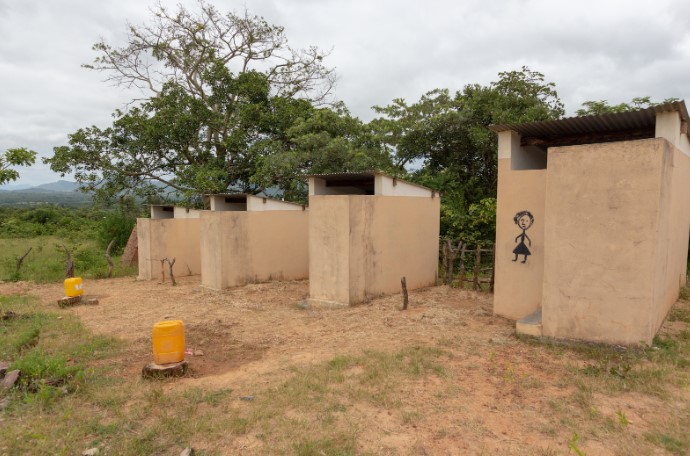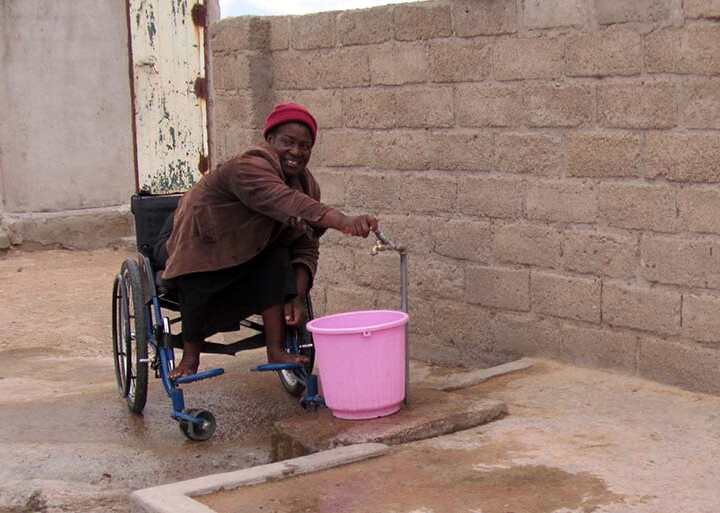WASH is a public health term that stands for Water, Sanitation, and Hygiene. WASH programs help developing communities gain access to clean water and adequate sanitation. The main goal of WASH initiatives is to improve health outcomes by reducing the spread of infectious diseases, especially those transmitted through contaminated water or inadequate sanitation facilities.
CBM Australia works with aid donors, NGOs, government agencies and disability organisations, providing advice on how to ensure that water, sanitation and hygiene programs are accessible to people with disabilities.
How CBM helps people with disabilities gain access to WASH initiatives
People living in the world’s poorest countries already have reduced access to health care facilities and adequate sanitation, and are more likely to rely on unsafe drinking water.
Inadequate sanitation increases exposure to infectious diseases and makes it difficult to maintain good hygiene practices. It’s an issue that still affects billions of people across the world. Universal access to basic sanitation, health facilities and safe WASH services is a basic human right.
With climate change making extreme weather events more likely, the health risks associated with unsafe water and sanitation services become even more dangerous. (Source: Unicef)
CBM Australia works with aid donors, NGOs, government agencies and disability organisations, providing advice to ensure safely managed drinking water, sanitation services and hygiene programs are accessible to people with disabilities.

CBM works with our partners and other organisations to implement WASH initiatives including:
- WASH systems
- safe drinking water
- handwashing facilities
- sanitation services
- wastewater treatment
- healthcare facilities
Case studies, research and learning
- Case Study: How DPOs and Civil Society Organisations have promoted disability-inclusive WASH
- Case Study: The Gender and Social Inclusion model – Zimbabwe
- Case Study: Partnering with DPOs in Sri Lanka
- A review by CBM of World Vision’s inclusive WASH project in Zimbabwe.
- An analysis by CBM and WaterAid on disability, gender and access to WASH in Papua New Guinea.
- Research summary by CBM and World Vision highlighting the challenges of bringing access to WASH for people with disabilities in Sri Lanka.
Training
- A training package on disability-inclusive WASH, developed for trainers in Timor-Leste
- A disability inclusion training toolkit and workbook developed by CBM and World Vision for local government staff to use when training local community volunteers in Zimbabwe.

Frequently asked questions about WASH
Water
This aspect focuses on ensuring access to clean and safely managed drinking water. It involves the protection and treatment of water sources, the construction of facilities to fetch water, and the implementation of sustainable water management systems.
Sanitation
Sanitation aims to provide safe and accessible facilities for the disposal of human waste. This includes the construction of latrines and toilets, the establishment of sewage treatment plants, and the promotion of practices that prevent human exposure to hazards.
Hygiene
Hygiene promotes practices such as handwashing with soap, dental hygiene, and safe food handling to prevent disease transmission. Education and behaviour change communication are critical components of hygiene promotion to ensure the adoption of healthy practices.
WASH is crucial for the health and well-being of populations, particularly in developing countries where access to these basic services is often limited.
Improving WASH infrastructure and practices can lead to significant benefits, such as reducing the incidence of diarrheal diseases, enhancing nutrition outcomes (particularly for children) and contributing to poverty reduction and economic growth.
WASH is also a critical element in disaster response, and refugee and internally displaced person camps to prevent the outbreak of waterborne diseases.
While everyone deserves access to the clean water and sanitation required for good hygiene practices, people with disabilities living in under-resourced communities are often disproportionately disadvantaged without these basic necessities.
Many countries still don’t have universal access to clean water and safe sanitation. Open defecation increases the chance of faeces getting into water supplies, leading to cholera and other diseases.
According to a 2019 report by the World Health Organisation, 3 billion people do not have access to basic handwashing facilities. The World Health Organisation further reported that 2.2 billion people do not have access to safe drinking water and 4.2 billion people lack access to sanitation services.
CBM has provided the following guidance on using WASH to address inadequate access for people with disabilities to sanitation and safe water in rural areas of low-income countries.
Notes
Briefing note on key actions needed to promote inclusive WASH throughout the project cycle, developed by CBM as a guide for World Vision WASH programs in Papua New Guinea, Sri Lanka and Zimbabwe.
- Guidance note on the foundations of disability-inclusive WASH to guide organisations to plan and budget for inclusion in the design of WASH initiatives.
- Guidelines for affordable and locally appropriate strategies for supporting hygiene for people with high support needs. These are based on learnings from CBM and World Vision’s work in Sri Lanka.
- Guidance for modifying toilets and water supplies.
- Guidance on conducting baseline assessments about inclusive WASH services, drawing from CBM’s experience supporting baseline surveys within WaterAid’s and World Vision’s WASH projects.
Flipcharts
Flipcharts developed with CBM advice to WaterAid on how elderly persons and people with disabilities can access water and sanitation facilities in Timor-Leste. You can view them here:
Audit templates
- Accessibility audit templates for public latrines and wash services, developed by CBM and World Vision for use in Sri Lanka.
